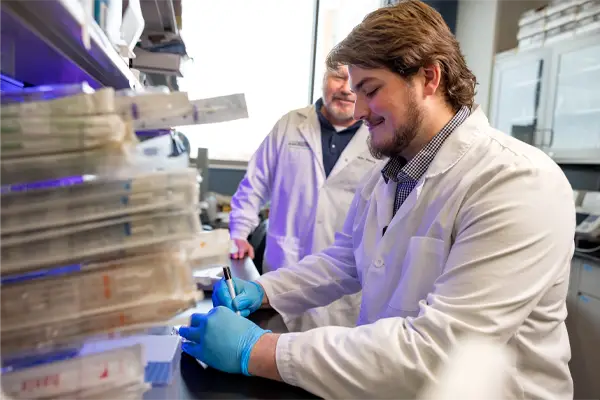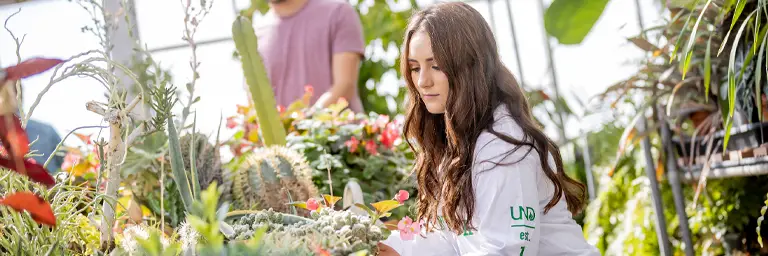Biology Degree
Explore the science of living things through well-rounded coursework and hands-on research.
A degree in Biology from UND gives you the foundational knowledge and skills to thrive in any career. Our flexible options allow you to customize your major in anything from wildlife to pre-health.
- Program type:
- Major
- Format:
- On Campus
- Est. time to complete:
- 4 years
- Credit hours:
- 120
Why choose UND's bachelor of science in Biology?
Why UND for your Biology degree?
-
Build strong research and communication skills by participating in interactive classes and research projects.
-
Engage in independent studies under direct faculty supervision.
-
Let our team of academic advisors help you plan your major. You'll also have access to personalized software to keep you on track to graduate in four years.
-
Participate in internships or experiential learning supported by local and national programs. Students have interned at the National Science Foundation Research Experience for Undergraduates (NSF-REU) and the National Institutes of Health Summer Undergraduate Biomedical Research Experience (SUBRE).
-
You'll have the opportunity to tailor your coursework to your primary areas of research. Many students study conservation biology, grassland ecology, or animals and their parasites.
-
Join organizations such a the Wildlife Society and North American Vascular Biology Association (NAVBO).
Career Opportunities with a Biology Degree
Courses You'll Take
Alumni Spotlights

Merrick McMahon
"UND made it easy to network with people. I met several mentors who helped me gain that confidence. They were there to guide me. They helped me believe in myself and showed me I shouldn't be afraid to pursue those leadership roles."
- Merrick McMahon, Biology and Pre-Dentistry Graduate
Mason Curtis
"The professors here genuinely care. My research mentor, Dr. Keith Henry, has been instrumental in teaching me lab skills and critical thinking."
"No matter where you come from, you can achieve anything. UND gave me the support to turn my goals into reality."
- Mason Curtis, Biology Graduate (B.S./M.S.)

Leader in Action
Biology student, Merrick McMahon, aims to improve health care in tribal communities.
Read Merrick's StoryFrequently Asked Questions
A B.S. in Biology opens doors to numerous career paths. Graduates can pursue advanced degrees in medicine, dentistry, veterinary science, or graduate research programs. Others enter careers in biotechnology, pharmaceuticals, environmental consulting, wildlife management, education, or government research labs.
Absolutely. Our B.S. in Biology with a Pre-Health emphasis is specifically designed to meet the requirements for medical school, dental school, and other health professional programs. It provides a strong foundation in the biological and chemical sciences, along with research and clinical opportunities that strengthen your application.
UND emphasizes hands-on learning. Biology majors can participate in faculty-led research projects, engage in independent studies, or apply for competitive summer research programs like the National Science Foundation's Research Experience for Undergraduates (NSF-REU) or the National Institutes of Health's Summer Undergraduate Biomedical Research Experience (SUBRE). Our modern labs and field stations provide excellent environments for discovery.
Yes. Our flexible curriculum allows you to specialize in areas that align with your career goals. Popular specializations include:
- Fisheries and Wildlife Biology (for students interested in conservation and ecosystem management).
- Molecular and Integrative Biology (for those aiming for graduate school or careers in biotech).
- Pre-Health track (for students planning to attend medical, dental, or veterinary school).
You can also customize a general biology track with internships or study abroad experiences.
UND's Biology program stands out for its combination of dedicated faculty mentorship, extensive hands-on research opportunities for undergraduates, and state-of-the-art facilities. We are large enough to offer diverse opportunities but small enough to provide a personalized and supportive learning environment. Plus, our location in North Dakota provides unique access to diverse ecosystems for field research.
Our rigorous curriculum, research opportunities, and faculty mentorship are designed to prepare you for the next step in your education. Many of our students go on to top graduate programs and professional schools. We also provide advising specifically for students applying to medical, dental, and veterinary schools, including help with applications, personal statements, and interview preparation.
Yes. We encourage students to gain real-world experience through internships with local and national organizations. Many biology students also participate in study abroad programs, which can be integrated into your degree plan.
